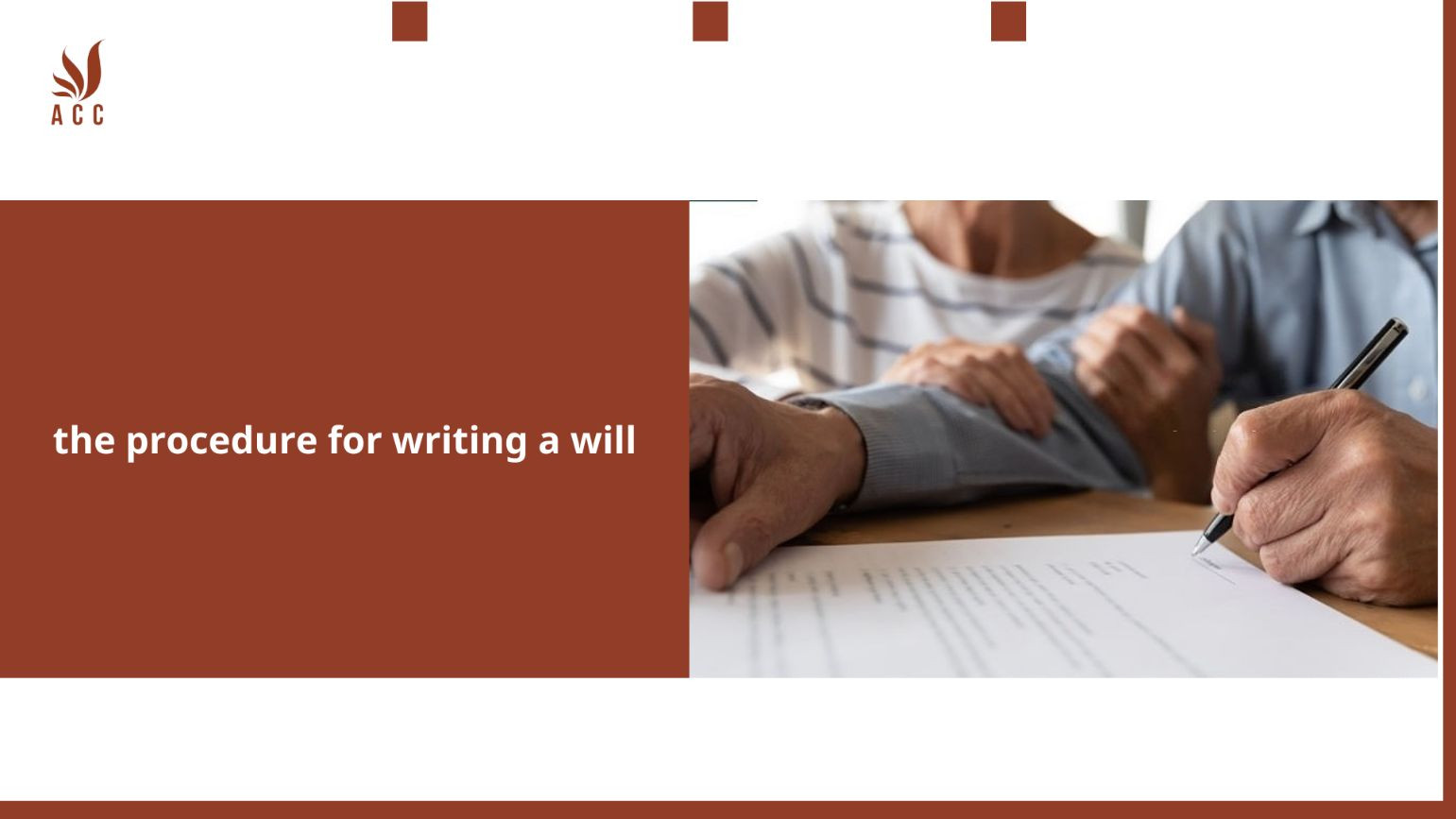Writing a will is an important legal process that involves several steps to ensure your wishes are legally documented and carried out after your death. Here is a general procedure for writing a will:
1. Initial Considerations:
- Determine your assets: Make a list of all your assets, including real estate, bank accounts, investments, personal property, and valuable possessions.
- Identify beneficiaries: Decide who you want to inherit your assets. This can include family members, friends, charities, or organizations.
- Choose an executor: Select a trusted individual to be your executor, responsible for managing your estate and ensuring your wishes are carried out.
- Consider guardianship: If you have minor children, think about who you would want to care for them if you and the other parent are unable to do so.

the procedure for writing a will
2. Consult with an Attorney (Optional):
- While not required, it's highly advisable to consult with an attorney who specializes in estate planning. They can provide legal guidance, ensure your will complies with local laws, and help address complex situations.
3. Drafting the Will:
- Write your will, which should include the following components:
- Introduction: Begin by identifying yourself as the testator and state that this is your last will and testament.
- Executor: Appoint your chosen executor and specify their responsibilities.
- Guardianship: If applicable, name a guardian for your minor children.
- Distribution of Assets: Clearly specify how you want your assets to be distributed among your beneficiaries. Be specific and use clear language.
- Digital Assets: If you have digital assets, consider including instructions on how they should be managed or distributed.
- Conditions: Include any conditions or contingencies, if necessary.
- Sign and Date: Sign and date the will at the end of the document.
4. Witnesses and Notarization:
- Depending on your jurisdiction, your will may require the signatures of witnesses. Some jurisdictions also allow for notarization. Consult your attorney for guidance on your specific location's requirements.
5. Safekeeping the Will:
- Store the original copy of your will in a secure location, such as a fireproof safe or a bank's safety deposit box. Inform your executor and trusted family members of the will's location.
6. When using ACC Law Firm's testament, entrepreneurs will receive
When using ACC Law Firm's testament, entrepreneurs will receive professional legal advice and assistance in drafting a comprehensive and legally binding will that reflects their specific business needs and objectives. The testament will ensure the smooth transition of their business assets and help protect their interests and those of their beneficiaries. Additionally, entrepreneurs will have access to ongoing support and guidance from experienced attorneys who specialize in estate planning for entrepreneurs.
7. Q&a
Q1. What is the procedure for writing a will?
The procedure for writing a will typically involves the following steps:
a) Determine your assets and beneficiaries: Take an inventory of your assets, including property, investments, and personal belongings. Decide who you want to inherit these assets, known as beneficiaries.
b) Choose an executor: Select a trusted individual who will be responsible for administering your estate and carrying out the instructions in your will. This person should be willing and capable of handling the responsibilities involved.
c) Seek legal advice: While not always required, it is advisable to consult with an attorney experienced in wills and estates. They can provide guidance on the legal requirements and help ensure your will is properly executed.
d) Draft the will: Write down your wishes and instructions for the distribution of your assets, appointment of guardians (if applicable), and any other specific provisions you want to include. Be clear and specific in your language to avoid any ambiguity.
e) Sign the will: You must sign the will in the presence of witnesses, who should also sign the document. The number of witnesses required varies by jurisdiction, but it is typically two or more. Witnesses should be impartial and not beneficiaries or spouses of beneficiaries.
f) Store the will: Keep the original will in a safe and accessible place, such as a safe deposit box or with an attorney. Inform your executor and loved ones of its location.
Q2. Can I write my own will without an attorney?
Yes, it is possible to write your own will without an attorney, especially for simple estates. However, it is recommended to seek legal advice, as there are specific legal requirements that must be met for a will to be valid. An attorney can ensure that your will reflects your intentions, complies with the law, and minimizes the risk of any potential challenges or disputes.
Q3. Can I make changes to my will after it is written?
Yes, you can make changes to your will after it is written. This can be done by creating a new will that expressly revokes the previous one or by making a valid amendment, called a codicil. It is important to properly execute any changes and keep the updated version in a safe place. It is also recommended to seek legal advice when making changes to ensure they are done correctly.
Q4. Should I inform my loved ones about my will?
While it is not necessary to disclose the specific details of your will to your loved ones, it can be helpful to inform them that you have a will and provide them with the general location of the document. This can help avoid confusion and ensure that your executor and beneficiaries are aware of their roles and responsibilities. However, the decision to share the specific contents of your will is entirely up to you.
Nội dung bài viết:






Bình luận